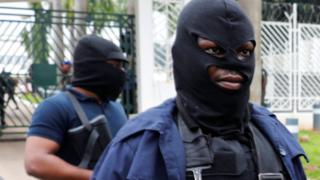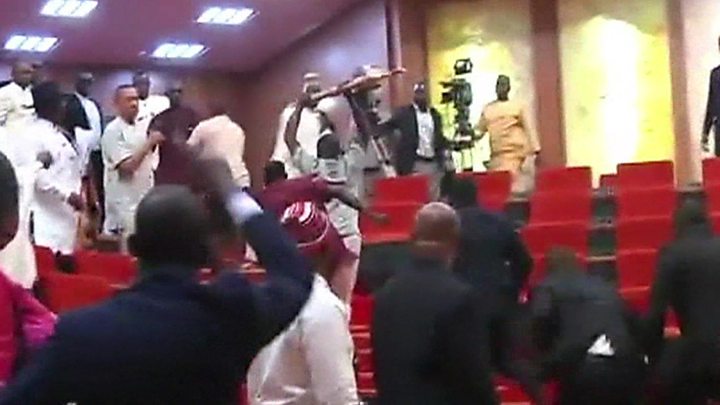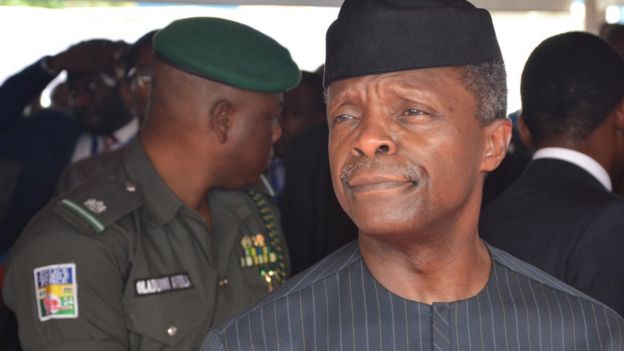Around the BBC
 REUTERS
REUTERS
In our series of letters from Africa, Nigerian writer and novelist Adaobi Tricia Nwaubani says scenes resembling a coup in her country have left many scratching their heads.
Nigerians still can't say for sure why armed, masked men held our country's parliament under siege last week. But the alarming incident had a most joyous ending.
They blocked all entrances to the building, denying lawmakers, civil servants and journalists access.
It turned out they were operatives of the state's spy agency, the Department of State Security (DSS), headed by Lawal Daura.
The other man at the centre of the drama is Senate President Bukola Saraki, who recently defected from the ruling APC party to the main opposition PDP.
He had called a parliamentary meeting of national assembly leaders - and it was this group that the armed men were blocking.
One theory is that it was a strong-arm tactic to make Mr Saraki resign so that the APC can appoint a ruling party senate president in his place.
The other theory is that it was all staged to make it appear as if it was officially sanctioned to make the government look bad.
'Invitation to anarchy'
Neither theory stands up to logical scrutiny, but you should never let anything surprise when it comes to the antics of Nigerian politics.
In April, a disgruntled MP allegedly organised for intruders to storm the Senate and steal its mace.

Decisions in the upper chamber cannot be approved without the mace - a large ornamental staff that represents the legislature's authority.
But when news spread of the events last week, including videos of angry lawmakers in confrontation with the armed state operatives, even Nigerians expressed their condemnation.
President Muhammadu Buhari was away in the UK on vacation, leaving his deputy Yemi Osinbajo in charge.

Adaobi Tricia Nwaubani:
"Nothing about Yemi Osinbajo excites the usual comedy that Nigerians have come to expect from our leaders"
"Nigeria is a democracy not a military dictatorship," said Atiku Abubakar, a former vice-president and PDP presidential hopeful.
"The acting president, being himself a professor of law, ought to know that setting such a precedent is an invitation to anarchy."
And indeed it was Mr Osinbajo who became the hero of the day.
Not only is Mr Osinbajo a professor of law and a former commissioner for justice, he is arguably one of the most distinguished leaders to have graced the Nigerian seat of power in the past few decades.

For starters, nothing about him excites the usual comedy that Nigerians have come to expect from our leaders.
His educational qualifications are without suspicion. His foot does not get jammed in his mouth each time he speaks. He has no known girlfriends flaunting flashy cars and shady contracts around the capital city, Abuja. He has no known cadavers stinking in his cupboard.
Mr Osinbajo has even been heard to apologise after arriving late at events. The typical Nigerian public office holder's self-importance can usually be measured by how long they can keep people waiting.
And the vice-president did not disappoint. While the siege was ongoing, he released a statement denouncing it as "condemnable and completely unacceptable".
Then he announced the immediate dismissal of Mr Daura - and the masked men were recalled to their lair.
You may also like:
- Can Buhari survive after dramatic defections?
- Cutting Nigeria's 'big men' down to size
- Could ranches solve Nigeria's herder-farmer conflict?
Again, Nigerians can't say for sure if Mr Daura was simply a scapegoat for a failed coup, or if he was indeed acting without presidential authority, motivated by his loyalty to Mr Buhari, his kinsman from the village of Daura in Katsina state, north-western Nigeria.
But, I promised you a happy ending, didn't I?
Midnight arrests
Many Nigerians feel that if it took the siege on parliament to be finally rid of the spy chief - then hurray.
In 2015, the sexagenarian was exhumed from retirement and appointed to head the DSS.
In the past three years of Mr Daura's leadership, the agency has been characterised by midnight arrests on those suspected of corruption, disdain for court orders, detention of a journalist without trial, and the harassing of lawmakers at a federal and state level.
Many Nigerians feared that as he came from Mr Buhari's hometown it had made him untouchable.
We had resigned ourselves to the ongoing nightmare.
But, as the saying goes: he whom the gods wish to destroy, they first make mad.
The madness that Mr Daura seemed to display by launching the siege has now led to his ignominious fall.
On the acting president's orders, Mr Daura was arrested and although released a few days later, his passport was seized.
Mr Osinbajo described his antics as "a gross violation of constitutional order, rule of law and all accepted notions of law and order". Mr Daura has yet to put his side of events.
But many Nigerians are now hoping that he will have that opportunity in court. What an even more joyous ending that would be - and one that follows the rule of law.
More Letters from Africa
- How Mugabe and white farmers changed sides
- 'Viewpoint: We Africans should get over colonialism'
- The quiz show taking Ghana by storm
- Mali 'Spiderman' is the hero the modern age needs
- Letter from Africa: Complaining about colonialism makes us the victims
- Letter from Africa: Why there was an uproar over the name Prince
- Letter from Africa: Mali 'Spiderman' is the superhero of our modern age
- Letter from Africa: The teenager fighting school bus sex pests
- Why Ghanaians are so slow to bury their dead
- Letter from Africa: The handshake that left millions of Kenyans confused
